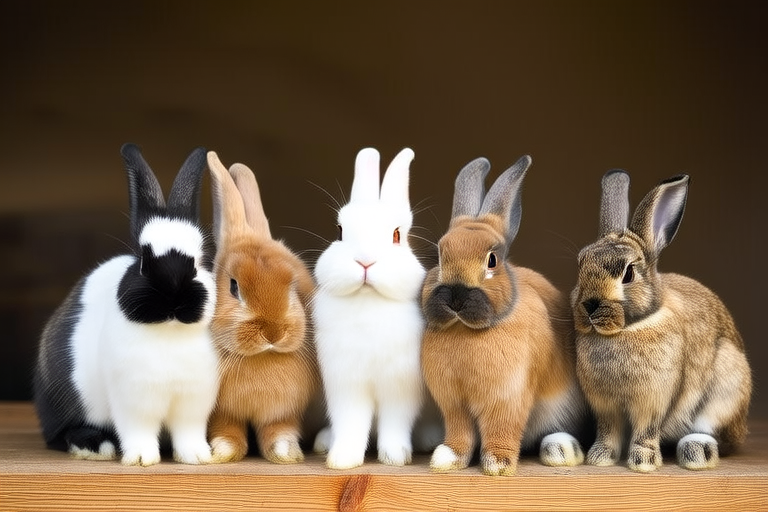Top 7 Myths About Dutch Dwarf Rabbits Debunked!

Dutch Dwarf rabbits are small, charming, and popular pets that have captured the hearts of many. However, there are several myths surrounding these adorable creatures that need to be debunked. This article aims to provide accurate information about Dutch Dwarf rabbits, based on scientific facts, personal experiences, and expert opinions.
Myth 1: Dutch Dwarf Rabbits Are Always Small
One common misconception is that all Dutch Dwarf rabbits are small. While it’s true that they are one of the smallest breeds of domestic rabbits, their size can vary depending on genetics and diet. According to the American Rabbit Breeders Association (ARBA), a mature Dutch Dwarf should weigh between 1.5 and 2.5 pounds. Anything outside this range may indicate health issues or incorrect breeding practices. Proper nutrition and regular veterinary check-ups are crucial for maintaining a healthy weight.
Personal Experience: I once had a friend who owned a Dutch Dwarf rabbit that weighed significantly more than the average. It turned out that her rabbit was overfed with pellets and lacked sufficient exercise. After adjusting its diet and providing more space to move around, the rabbit’s weight normalized.
Myth 2: They Don’t Need Regular Exercise
Another myth is that because Dutch Dwarfs are small, they don’t require much exercise. In reality, these rabbits need just as much activity as larger breeds to stay healthy and mentally stimulated. Lack of exercise can lead to obesity, digestive problems, and behavioral issues. Providing them with ample space to run, jump, and play is essential for their well-being.
Expert Opinion: Dr. Sarah Thompson, a veterinarian specializing in exotic pets, advises, “Even though Dutch Dwarfs are tiny, they still need at least three hours of supervised playtime daily. This helps prevent boredom and keeps them physically fit.”
Myth 3: Their Teeth Don’t Grow Continuously
Many people believe that rabbits’ teeth stop growing after a certain age. However, this isn’t true for any rabbit breed, including Dutch Dwarfs. Their teeth grow continuously throughout their lives. Therefore, it’s important to ensure they have enough hay and chew toys to wear down their teeth naturally. If their teeth become overgrown, it can cause pain, difficulty eating, and other serious health issues.
Scientific Fact: Rabbits have hypsodont teeth, meaning they grow continuously from the roots. This adaptation allows them to process fibrous plant material efficiently.
Myth 4: They Only Live for a Few Years
It’s often thought that small animals like Dutch Dwarf rabbits have shorter lifespans. While their average lifespan is around five to eight years, proper care can extend this considerably. Factors such as diet, environment, and veterinary attention play significant roles in determining how long your rabbit will live.
Personal Experience: My aunt’s Dutch Dwarf rabbit lived for almost ten years due to her dedication to providing a balanced diet, regular vet visits, and lots of love.
Myth 5: They Can Be Kept Outside Year-Round
There’s a belief that since Dutch Dwarfs are small, they can comfortably live outdoors all year round. However, this is dangerous for several reasons. Extreme temperatures, whether hot or cold, can be harmful to these delicate creatures. Additionally, outdoor environments pose risks from predators, parasites, and diseases. Indoor living ensures better protection and comfort for your rabbit.
Expert Opinion: Dr. Thompson emphasizes, “Indoor living provides a safer and more controlled environment for Dutch Dwarfs. It protects them from harsh weather conditions and potential threats.”
Myth 6: They Are Low-Maintenance Pets
Some might think that because Dutch Dwarfs are small, they are easy to care for. However, like any pet, they require consistent attention, cleaning, grooming, and social interaction. Regular cleaning of their living area, trimming nails, and checking for signs of illness are all part of responsible rabbit ownership.
Personal Experience: I learned the hard way that neglecting grooming can lead to matted fur and skin issues. Now, I make sure to brush my Dutch Dwarf rabbit weekly.
Myth 7: They Don’t Get Along Well With Other Animals
The final myth is that Dutch Dwarf rabbits are aggressive towards other animals and humans. In truth, these rabbits can be very social and friendly if properly socialized. They can coexist peacefully with other pets and enjoy human companionship when introduced gradually and positively.
Expert Opinion: Dr. Thompson suggests, “Early socialization and positive reinforcement training can help Dutch Dwarfs get along well with other animals and people.”
By understanding and addressing these common myths, we can better care for our Dutch Dwarf rabbits and ensure they lead happy, healthy lives. Remember, every rabbit is unique, so always tailor your care approach based on individual needs.
